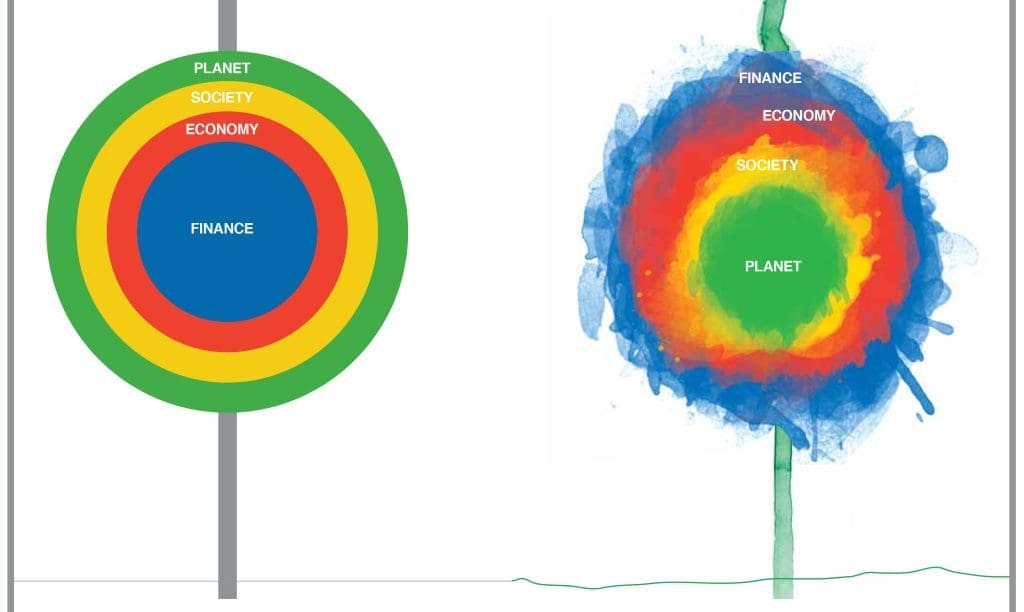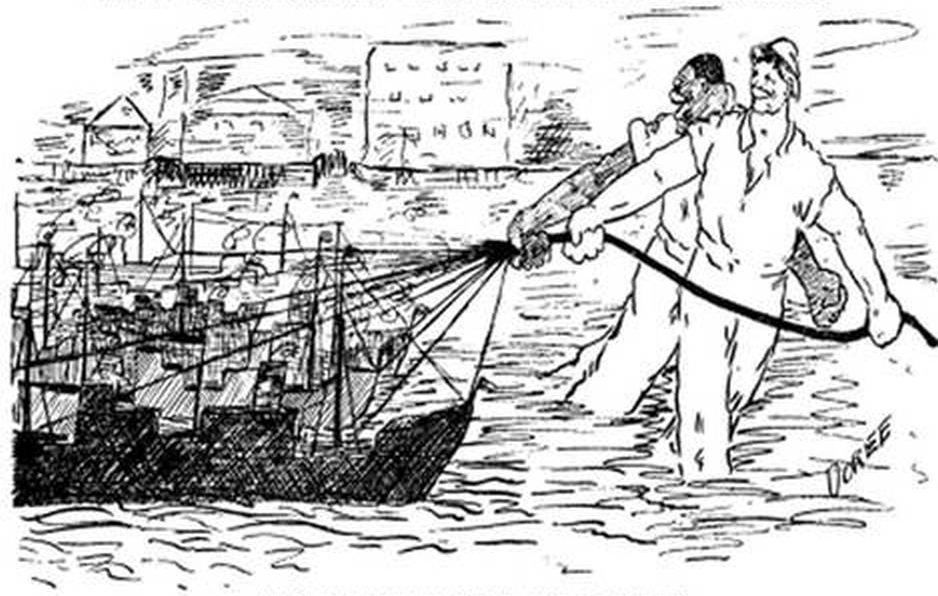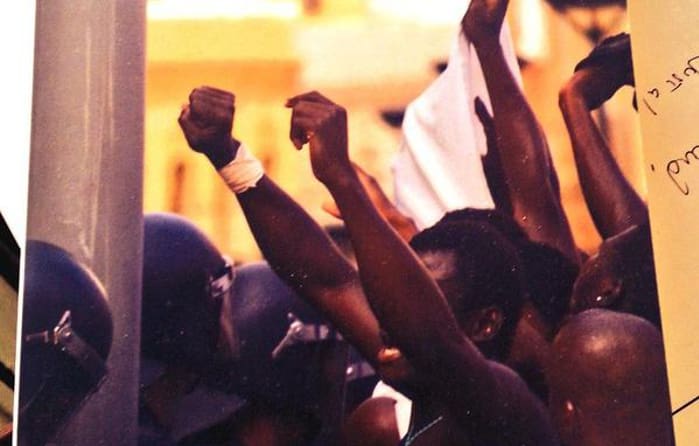Transcribed from the 6 May 2017 episode of This is Hell! Radio (Chicago) and printed with permission. Edited for space and readability. Listen to the whole episode:
The economics that we are being taught comes out of textbooks from 1950. And those theories are, in turn, based on the theories of 1850. Given the challenges of the 21st century—climate change, extreme inequality, repeated financial crises—this is shaping up to be a disaster.
Chuck Mertz: If you’re like me, Econ 101 bored the hell out of you. All those charts and graphs that seemed so disconnected from reality, and a complete lack of conversation about the real economic challenges of our time made me lose interest in the course so fast I started blowing it off after only a few classes.
But today there’s a revolution, an uprising happening within the economics curriculum that is challenging the failed assumptions we’ve been taught for far too long. Here to tell us about it, economist Kate Raworth is the author of Doughnut Economics: Seven Ways to Think Like a 21st-Century Economist.
Welcome to This is Hell!, Kate.
Kate Raworth: Thank you, delighted to be here.
CM: You quote a Chinese economics student who started her studies at Oxford just before the financial crash. You write how the student, Yuan Yang, had become frustrated with the economics curriculum. Yang tells you, “The crash was a wake up call. On the one hand we are being taught as if the financial system was not an important part of the economy, and on the other hand its markets were clearly wreaking havoc. So we asked, ‘Why is there this disconnect?’”
Then you add, “Yang realized it was a disconnect that ran far beyond the financial sector, visible in the gulf between the preoccupations of mainstream economic theory and growing real-world crises such as global inequality and climate change.”
So how disconnected is the way economics is taught from real world applications?
KR: It is severely disconnected. Students like Yuan Yang, and millions of others who are going to university today to study economics because they want to change the world, understand that the language of economics is the mother tongue of public policy—which is why so many people, in the US particularly, do Econ 101. You need a little bit of economics to get by.
These people are the policymakers of 2050. They are going to be shaping our societies and our economies through this century. But the economics that they are being taught comes out of textbooks from 1950. And those theories are, in turn, based on the theories of 1850. Given the challenges of the 21st century—climate change, extreme inequality, repeated financial crises—this is shaping up to be a disaster.
I studied at university 25 years go, and I walked away frustrated. It didn’t cover the issues I cared about. When I came back to it, I wanted to flip it on its head and be part of the movement to rewrite economics. When I went back into my old textbooks, I discovered that although economics is sometimes said to be about equations and you have to be good at math, actually the core of economics is taught to us in some basic diagrams.
One of those diagrams is the biggest picture of the economy that an economist can show you: they call it the circular flow diagram. It’s just money going around between households and businesses in the market, and some of it goes through government, some of it goes through banks, some of it goes off into trade. It’s the biggest picture they have of the household. It makes absolutely no mention of the living world or the material resources and the energy that we draw into the economy every day and all the waste it spews out. It makes no mention of the unpaid caring work of parents, particularly women—all that cooking, washing, feeding, cleaning, and raising kids that produces labor ready for work every day. It makes no mention of the commons, the space where people self-organize and get together without using the market and without the state and produce goods and services they value, whether it’s a community garden or Wikipedia on the internet.
If we’re still teaching economics to students today without mentioning the living world that we’re destroying, the unpaid care of parents (which is crucial), and the commons (which is just about the most dynamic part of the economy), we are leaving them well short of the worldview they need to take on the 21st century.
That’s why they’re rebelling, because they know what they’re being taught is in no way equipping them for the future that’s coming at them.
CM: How does that circular flow diagram, then, mislead those who are either taking economics courses or those laymen, especially voters, who are simply trying to understand our economic system?
KR: Let’s first of all talk about the students. If an economics professor were listening to me right now, they’d say, “What you’re saying is not fair. Of course we talk about the living world and the environment. We call it an externality. When the market impacts the environment, whether it’s to pollute the air or change the climate, it’s an externality, and we care about those.”
To which I would say: If you can refer to the living world and impacts on it as an “externality,” you’ve already told me how important it isn’t. It’s actually the living world on which the economy depends and survives, so if your framing makes it external to the economy, and you’ve marginalized it to the edge of your theories.
When it comes to laymen: even if you’ve never studied Econ 101, we’re all imbued in its diagrams. It’s the way politicians talk. It’s the way journalists talk when they talk on the radio about the economy. Because the circular flow diagram shows you only where the money goes. It just tracks the flow of money. This is the basis on which GDP or national income is measured. And that fuels the obsession with what’s happening to GDP, because it’s the only thing we can see, going round and round the circuit in the biggest diagram that we have. It’s the only goal we can invent: let’s make GDP get bigger! That’s surely a good enough sign that we’re doing well, isn’t it?
It’s not. But that’s the way that our societies talk about the economy, the way it has been shaped for the last eighty years (since GDP was first invented in the 1930s). We’ve got to overthrow that and come up with a much smarter understanding of what economic success looks like in the 21st century.
We value so much more than what we can buy and sell. We value our community. We value belonging—the affection and trust of our community. We value volunteering and being part of something that’s bigger than ourselves, and the recognition we get from that. All of that is outside the paid economy. Trying to strip values out of economics is a completely false game.
CM: So there was a time, then, when the study of economics that Yang and her colleagues criticize was a better reflection of reality?
KR: That’s a really interesting question. We can go back to the days of Adam Smith. He’s been really maligned, because he’s been very misunderstood, and what he wrote about economics got very stripped down. But at least Smith, in trying to define what economics is, said that the science of economics is defined around two goals. One: to enable everybody to meet their subsistence needs together, and two: to raise enough money for the public purse to provide public goods.
He defined economics with a goal, with a purpose. But over the years, economists wanted to make economics more like a “reputable” science, like physics. And physics doesn’t have a goal, it’s an inquiry. So they stripped away these goals that Adam Smith was talking about, and they just said things like, “Economics is the study of people as they go about their daily life. It’s the study of how we use scarce resources for competing ends.” Which is completely false. It was never the study of that. Economists created this character, Rational Economic Man, and they stuck him in the middle of a very narrow, stylized version of who humans are. They weren’t studying people at all.
It became a very model-based, stylized theory that had no goals. And in the place of those absent goals there snuck in GDP growth. It became the tacit goal of what economics is for. That’s the problem. We need to go back—or indeed forward—to a time when we ask, “What’s the economy for?” What is the point of economics? In the 21st century, given the challenges we have—ten billion people are going to be on this planet—the goal of economics should be to figure out how we can meet the needs of all within the means of this planet. We should teach and create an economic mindset that gives us the best chance of making that happen.
CM: How much does that kind of dispassionate or attempted objective look at economics actually end up leading to a bias that is then ignored?
KR: It’s huge. There is no objectivity in economics. It’s absolutely based on our values. Even the concept of utility is based on what we value. The trouble with the idea of utility at the heart of economics and with Rational Economic Man running around trying to maximize his utility is that it ends up only capturing things that have a price on them. We value so much more than what we can buy and sell. We value our community. We value belonging—the affection and trust of our community. We value volunteering and being part of something that’s bigger than ourselves, and the recognition we get from that. All of that is outside the paid economy.
Trying to strip values out of economics was a completely false game, and it was part of this desire to make it look like an objective science—and since it’s objective then it somehow isn’t political. Whereas it was always deeply, deeply political.
CM: Why did the way economics was taught change? We’ve had guests on the show in the past like economist Dean Baker, and Dean talks about how economics departments are more and more dependent upon private funding from corporations (at least here in the United States), with less and less government funding for education.
Is that one of the reasons why the way that economics was taught changed? Was it because of private influence or industry influence on schools, or was it something else?
KR: It was partly that. It’s also partly a belief that somehow mathematical sciences are the more prestigious sciences, so there was a desire to bring math into economics and turn it into a mathemetized science. Students today say to me, “God, I wanted to study economics, but then it just got so dry, and it was just about equation sets, and that’s not what I want to do.” It doesn’t have to be expressed in math. Go back to the greats: John Maynard Keynes, Adam Smith. They wrote almost poetically. They wrote lyrically. It was much wider.
But I want to pick up on this point that Dean Baker made about money coming from corporations. It’s not only from that, but similarly: almost exactly seventy years ago, in April 1947, a small band of economists—including Friedrich Hayek and Milton Friedman met in a little Swiss village called Mont Pèlerin, because they wanted to create a new narrative of economics. They wanted to create a story of what economics is and what it’s for. They called it neoliberalism.
Let’s be fair to them: they were afraid of the rise of state totalitarianism that they could see in the Soviet Union and other Eastern European countries. So they created this idea of neoliberalism, based on the belief that if you give the state an inch, it’ll take a mile, and it’ll swallow up society. So you can’t let the state have any role. But their pushback against state totalitarianism very quickly morphed into market fundamentalism.
If we want to change the way that economies are being run and transform the neoliberal narrative, we need to write a new narrative for our century that puts the living world at the heart, that understands that we thrive upon society and our connections to each other, that makes sure that the market serves people and that finance serves the market, and it’s all in service to life.
And although they came up with this idea in the 1940s, it didn’t get onto the international stage for decades. But they were smart. They set up think tanks. They funded chairs in universities. They funded professorships. They sponsored leading academic journals. They captured the institutions of economics—the reputable, prestigious places—and when Margaret Thatcher and Ronald Reagan both came to power in the early 1980s, they were the first people to put this new script of what the economy is, the neoliberal story, on the international stage. And it’s the script that we’ve lived by ever since. Because these think tanks have been put in place—and the professorial chairs, the journals—the equipment of academic economics has supported and reinforced it for decades.
CM: You write, “The way economics is taught spurred Yuan and her fellow rebels to launch a global network connecting over eighty student groups in over thirty countries—from India and the United States to Germany and Peru—in their demand for economics to catch up with the current generation.”
You quote the students writing in their manifesto: “The revolution of economics has begun. On campus after campus, we will chase you old goats out of power. Then, in the months and years that follow, we will begin the work of reprogramming the doomsday machine.”
That is great manifesto writing right there. How much would their way of studying economics challenge the economics that Wall Street not only embraces, but benefits from?
KR: The students, Yuan and others, have put together a movement called Rethinking Economics, and anybody—whether you’re a student today, or were a student, or even just interested in economics—can join that movement and be part of it. What the students are calling for is “pluralism.” They’re saying they don’t want to be taught just neoclassical economics that underpin Wall Street’s thinking. They want to be taught many, many different opinions.
I want to go beyond that, however. It’s great, at the academic level, to be taught many perspectives and then choose your own view. But as the wonderful American inventor from the last century Buckminster Fuller would say, you don’t change things by criticizing the existing model. To change something, you create a new model that makes the old model obsolete. So I want to learn from Friedman and Hayek and the others who got together in the 1940s and came up with the neoliberal narrative: if we want to change the way that economies are being run, and transform this narrative, we need to write a new narrative for our century that puts the living world at the heart, that understands that we thrive upon society and our connections to each other, that makes sure that the market serves people and that finance serves the market and it’s all in service to life. It’s a fundamental challenge to the mainstay of Wall Street, where we’ve been told, in the neoliberal narrative, that finance is infallible. Financial markets will take into account all available information! You can’t trick the market! You can’t beat the market! Trust in finance!
That all came tumbling down in 2008, when it was obvious that finance didn’t even know what it was doing with its own information. It created this concoction of financial products, and nobody knew what was connected to what, and the whole web fell apart.
That kicked open the debate into rethinking economics. It can’t only be about rethinking finance. We have to stand back and take in the much bigger picture, because there’s a lot more at stake, and a lot more to be won, than fixing the financial system.
CM: You’re critical of using GDP as a barometer for economic success. While increased GDP may be bad for the planet, isn’t it good for an individual’s bottom line? Doesn’t it mean that you’re more likely to be working at a decent wage? I guess my bigger question is: is there a zero-sum game being played between GDP and the existence of our planet?
KR: We should ask three questions. One: Okay, the economy is growing. Growing out of what? Is the economy growing because, as in China, the government is investing $360 billion in solar energy capacity by 2020? That investment in renewable energy will be a big boost to GDP in China. Or, is the economy growing because our government is cutting into the hillsides and digging up tar sands and drilling for oil—last century’s fuel—and destroying a lot of the landscape (and by the way, putting greenhouse gas emissions in the atmosphere that threaten climate change)? Is that why GDP is growing? Very, very different reasons, both producing GDP. So: GDP is growing out of what?
Second: GDP is growing for whom? GDP is just the total. But who is getting this increase in money when it grows? Is it going to the 1% (who do capture the vast majority of GDP increases at the moment)? Is it going to the financial system where they’re creating some new concoction of financial products, increasing their incomes? Or is GDP rising because people living on the lowest incomes who cannot afford life essentials are getting jobs and they’re earning more money? That’s what really matters. Just knowing the GDP on average is going up isn’t enough. We need to know who is benefiting.
And then thirdly: for any reason that GDP is growing, whether it’s investing in health or education or solar energy capacity or in the incomes of the lowest earners, you can ask, Until what point? At what point will it mature and thrive? In nature, growth is a really healthy phase, but from your children’s feet to the Amazon forest, nothing grows forever. It grows until it matures and comes to thrive. If investment in schools is growing, I say that’s fantastic. At what point will we have enough schools and teachers so that every child has a really great opportunity and start in life? At what point will we have invested in enough solar energy that we can meet our needs and harness the most we can get from the sun? We shouldn’t expect growth forever and ever. We need to grow until we thrive. It’s a completely different mentality.
Of course it’s extremely challenging to mainstream politics and economics, because growth mentality is so deeply embedded. But if we’re going to thrive and survive this century, I really think it’s time to flip the paradigm, and ask those three questions: Grows out of what? Grows for whom? and Grows until when?
Economics means “household management.” When it comes to our planetary household, this couldn’t be more relevant. We urgently need a new generation of young people who want to manage this household in the interests of all of its inhabitants.
CM: How much is the problem currently with economics that context, values, and aims have evolved while the economic system that we’re being taught has not?
KR: Students who go to university today are in a connected world. They’re in a “sharing economy.” They don’t want to own cars, they want to rent cars. They have 21st-century values; they see themselves as global citizens. But as I said earlier, when they open these textbooks, the diagrams are old. The circular flow diagram was first drawn in 1948. They are being thrown back into a mindset that is deeply out of date.
Because of the prestige of economics, and because it’s so often taught in equations—I have sat in on lectures, and I see students struggling, and I can see them thinking, “This doesn’t make sense to me, but maybe I just don’t get it. I’m at university now, and maybe I don’t get the math.” And they put their hand down and they keep quiet and they think, “It’s something wrong with me.”
That’s what makes me really angry. Because the frameworks are outdated. It’s not something wrong with them. It’s something wrong with what they’re being taught. That’s what inspired me to write my book. I decided I want to write the book that I wish I could have read when I was an undergraduate that would have made me see. This is a way of understanding the world that makes sense to me, that puts the things I care about at the heart of the picture, it doesn’t push them to the side and call them externalities. It puts the values that matter at the heart of the picture, and it makes me feel confident that I want to be a 21st-century economist.
Economics means “household management.” And when it comes to our planetary household, this couldn’t be more relevant. We urgently need a new generation of young people who want to manage this household in the interests of all of its inhabitants.
CM: You were saying how the economics student might be thinking “The problem is me.” How much does the embrace of the individual, the self-made myth, the self-centered approach to human nature, in your opinion, misrepresent not only humanity, but mislead the public about humanity and the economy?
KR: I think it’s huge. The creature of humanity, the protagonist at the heart of the neoliberal economic story and economic theory is Rational Economic Man. He’s like a little atom. Economics wanted to be like physics, so they created this little atom at the heart of the story in order to understand it from the atom up. Rational Economic Man as a portrait is never actually depicted in the economic textbooks, but if he were, he’s be a man; he’d be standing alone; he’d have money in his hand, ego in his heart, a calculator in his head, and nature at his feet.
Not only is this an absurdly narrow depiction of who we are, but one of the most fascinating things I learned in the process of researching this book was the impact that looking at him has upon us. When we’re told that he is like us, we actually become more like him. Research in the US and in Israel found that the more that economics students learn about this character, Rational Economic Man, the more they value self-interest, and the less they say they value compassion, altruism, and interest in others. So it matters a great deal who we tell ourselves we are, because that shapes who we become.
There’s an enormous responsibility on economics—and those of us who want to rewrite economics—to describe ourselves in a far wiser and richer way. Because we are cooperators. We are collaborators. If we punish people when they don’t cooperate with us, that’s about reciprocation. We are deeply interdependent on one another, whether it’s people’s advice on fashion or what other people are doing in the stock market. And we’re not dominant over the living world; we’re deeply embedded within it. Until we put those real traits of ourselves into our economic portrait, we won’t give ourselves a chance of thriving, all ten billion of us, together on this planet.
CM: But can we thrive without growth?
KR: Absolutely. Think of everything in nature. Everything in nature grows until it’s mature, and then it thrives. If we want to thrive and endure on this planet as a species—and I’m not just talking about the next four years, the next ten years; I’m talking about for decades, for centuries, even millennia if we’re going to be ambitious—we need to learn to come to thrive without growth. In our own bodies, when something tries to grow forever we call it a cancer. And we are scared of it, because we know that something that grows forever inside its host kills its host. So we need to be a really smart species and ask ourselves: How do we grow the good things in life until they come to thrive?
Of course one of the critical things is that the human population ultimately needs to stop growing. We need to come to thrive as a species and mature in our size, but then we also need to make sure that the way our aspirations, the technologies we use, the way we share and regenerate resources, means that our impact on the planet is not continually growing. Otherwise we will kill the host on which we depend.
CM: How much does the Econ 101 course that so many people are required to take—no matter what their field of study is—indoctrinate the public into supporting an unfair system whether the students realize it or not? Are the basic assumptions of economics, that are taught across myriad disciplines, misleading?
KR: Absolutely. I profoundly believe that the fundamental pictures that we’re taught and the story that we’re told deeply shape how we come to understand the world. The most influential economist of the last century, Paul Samuelson, the man who drew that circular flow diagram, said: “I don’t care who writes a nation’s laws or crafts its advanced treatises, so long as I can write its economic textbooks.” Because he knew that when you write the textbooks, and you get to draw those pictures and shape the fundamental concepts, you shape the understanding of how the economy will be run. I think Econ 101 is dragging us back into the very divisive and degenerative last century. We need to rewrite it: economics that’s fit for this century. The students today damn well deserve to be taught something that is worthy of their aspirations.
CM: I really appreciate you being on the show with us this week.
KR: My pleasure.
Featured image source: Kick It Over





